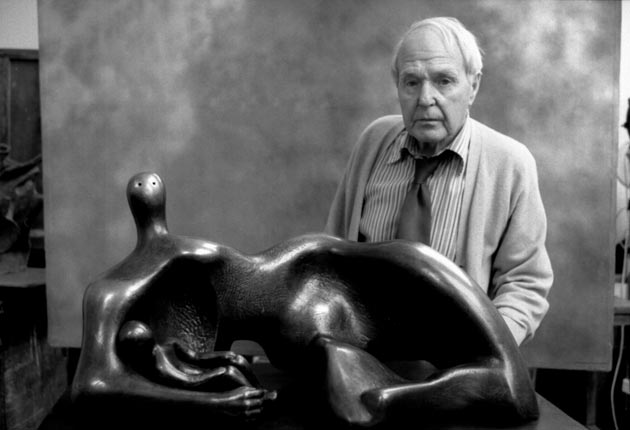BBC to reveal unseen Henry Moore
Groundbreaking deal allows footage of sculptor at work to be shown to public. Ian Burrell reports

Sixty-year-old films of Henry Moore, Britain's most famous sculptor, working in his studio are to be released later this month as part of a project that could transform the experience of visitors to museums and galleries across the country.
A deal has been struck by the BBC and the Henry Moore Foundation, which owns rights to the footage, to release for public viewing a collection of 14 films and one audio recording, made by the corporation over nearly half a century. They are to be included in the major Moore retrospective that is due to open at Tate Britain on 24 February.
The films will also go on show at Perry Green, Moore's former home in Hertfordshire, and at other museums and galleries that stage exhibitions of the artist's work. All the footage, which includes a series of programmes by the acclaimed documentary-maker John Read and interviews with the sculptor, will also be available on the archive section of the BBC's website.
Tate Britain has described the arrangement with the BBC as "a groundbreaking move" and said it could improve the visitor's experience for future exhibitions involving other artists by acting as a blueprint for the release and use of previously hidden archive footage.
Jane Burton, head of content and creative director at the Tate, said: "Not only the Tate but every other public collection or museum with Henry Moore holdings can show this material to help people enjoy and understand more about the artist's work."
The Tate used BBC archive footage of Francis Bacon for an exhibition in 2008, but this is the first time such film material has been cleared for use on a national scale. Read's 1951 film, Henry Moore: Art is the Expression of Imagination and Not the Imitation of Life, shows the entire process from sketch to bronze sculpture, as Moore creates Reclining Figure, the piece he was commissioned to produce for the Festival of Britain.
The film will be screened at the start of the Tate's exhibition. Ms Burton said: "Watching the process of an artist making a work from scratch is something that no words can give you. It's an authenticity that the ranks of curators and experts can never bring."
The Yorkshire-born sculptor is also shown in a station on the London Underground, where the sight of sheltering Londoners during the Blitz gave him inspiration for some of his sculptures.
Martin Davis, of the Henry Moore Foundation, said Moore's studio at Perry Green had recently been reopened and the footage of the artist at work would help bring it to life. "These films have been locked up in the BBC archive for many years and this is the first time that they will get a wider audience," he said.

Watch Apple TV+ free for 7 days
New subscribers only. £8.99/mo. after free trial. Plan auto-renews until cancelled

Watch Apple TV+ free for 7 days
New subscribers only. £8.99/mo. after free trial. Plan auto-renews until cancelled
Roly Keating, head of the BBC archive, said Read had "invented the genre" of the arts documentary. "He developed a relationship of trust with Henry Moore and persuaded him that this newfangled television thing was potentially a great medium, not a trivialising one."
He said the film collection could make the BBC money by being made available at a price to museums around the world. "Overseas there may be scope for it to have a commercial life. I think around the planet there's a Moore exhibition every two months, so the global interest in the legacy of Henry Moore is almost unique."
Ms Burton said the Tate had started to create its own video archive of living artists at work so that there can be a film dimension to future exhibitions. "But with the people that are long gone the only way is to get these films from the BBC," she said.
As part of the project, a two-part study of the sculptor Henry Moore – Carving a Reputation, made in 1998, will be shown on BBC Four.
Subscribe to Independent Premium to bookmark this article
Want to bookmark your favourite articles and stories to read or reference later? Start your Independent Premium subscription today.

Join our commenting forum
Join thought-provoking conversations, follow other Independent readers and see their replies